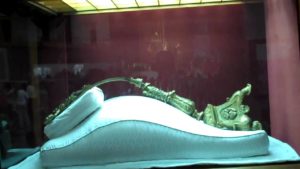[AUTHOR'S NOTE: Another in the series of articles explaining how evolution theory requires luck or intent in order to be reconciled with existential science knowledge and current understanding. The original content has been reformatted and lightly edited to make it easier to read.] DNA: the ultimate source code In my writings as Atlanta Creationism Examiner, I have never pretended to be a scientist. On the other hand, for two decades I wrote computer software for a living, so I am considered an expert by many in the field of software development and application programming. In college I was taught “Computer Science”, called Management Information Systems in Business school, but I never really considered programming software a “science.” Science seems to take place most often in an ivory tower paid for by government grant. By the same token, I saw very little management of information systems in the real world. Our code more behaved like electronic assistants to help do a job as opposed to decision makers who told you how. If there's any one thing that I know about computer software that will always be true, it's that you cannot guess what will happen inside the machine simply be reading its source code. If something is in code, it is a form of software. That means it has been designed. Look, I know how software works; I have created applications that remains in use today, years after leaving the business. I know the computer is no smarter than its programmer. I wrote banking software, translation tools, financial applications, email service providers … [Read more...]
Archives for 2016
The conjecture of evolution theory
[AUTHOR'S NOTE: This is the second installment of the series of articles originally published at Examiner.com while I was writing as the Atlanta Creationism Examiner. Lightly edited and re-formatted from the original version.] The conjecture of evolution theory Change occurs constantly. It’s impossible to deny. However, the word “evolution” is often used analogous with virtually all “change”. That definition is much too ambiguous. The philosophical theory called evolution describes an ambiguous process by which new life forms allegedly are created if given enough time. I will repeat the question I have invited my biologist friends to answer: Assuming “evolution” is true, how does sexual reproduction create a new genome that alters a creature’s morphology to be different enough from its parents to be called a new animal (or plant)? What magic elixir or ingredient besides time causes or allows for this sort of change (I have somewhat mockingly referred to as shape shifting) to occur? Surely we can all agree that for Archaeopteryx to evolve into another creature or vice versa, there has to be some point in time where the “base” parent animal (stealing terminology from my objected-oriented past) can be differentiated from the “derived” child animal as a fundamentally different organism, correct? Surely some explanation other than sexual reproduction can account for different morphologies in variant organisms derived from DNA? In layman’s terms -- at some point in time, my zoologist friends have got to be able to say the offspring of an Archaeopteryx is … [Read more...]
The “facts” of evolution theory
[AUTHOR'S NOTE: This was another article originally published as the Atlanta Creationism Examiner, the first in a short series written shortly before the publication of my book Counterargument for God. The purpose of the series was to explain my alternative to Darwin's theory of natural selection as the best potential explanation for the origin of new species, based on the existing evidence. Although my alternate hypothesis involves a supernatural intelligence capable of designing the universe and life within, it is called iterative creation. Other articles in this series include The conjecture of evolution, Compounded improbabilities, and Iterative creation. This morning an atheist acquaintance on the internet inspired publication of this piece (originally written in 2012) by accusing me of advocating intelligent design as a scientific theory. The reality is that my argument is almost the polar opposite extreme -- iterative creation is a philosophical hypothesis that competes with the philosophy known as "macro" evolution to explain the existing scientific evidence, which consists of DNA analysis, the known fossil record, and comparative anatomy.] The "facts" of evolution This might take a while. The argument from authority, which could also be called the argument of superior intellect, gets old after a while. You don’t have to convince me that you’re smart. I'll give you the benefit of the doubt. You only need to convince me that you’re right. Then I'll actually believe what you tell me. A new Facebook friend tried to help me, sending a link to … [Read more...]
Proof versus evidence
Some of my atheist friends (excluding my friend Kyle, of course) are always demanding proof that God exists, but I've come to realize that they don't really mean it. What most of them want is to insist they have no reason to believe in a supernatural God, but generally because they simply don't want God to exist, because that would conflict with their existing worldview. Demanding proof that God exists implies that person does not fully understand the concept of faith. Proof and faith are mutually exclusive. If you have proof, faith is no longer required. Don't believe me? Let me prove it to you. (Pun intended) Anyway, honest scientists don't talk in terms of proof. Scientists mostly talk about what they can deduce from what the evidence tells them. Personally, I think that I waste too much of my life arguing with unhappy atheists. I don't particularly enjoy being constantly needled or ridiculed by very angry people simply for expressing my opinion, especially I don't really consider myself any sort of evangelist for Christianity. I'm just a writer. My best writing seems to focus on things that interest me, and because I consider myself a Christian, alleged evidence that supports Christian faith interests me quite a bit. But I understand that when I seek information about a story, I'm not seeking proof the story is true. I'm merely seeking evidence to support or debunk a claim being made. For example, I've said before that the Shroud of Turin will never and could never be fully authenticated as the burial cloth in which the body of Jesus Christ was … [Read more...]
Encouraging my Christian friends to think…
[AUTHOR'S NOTE: this seemed like an important article several years ago when I originally wrote it for Examiner.com, yet it seems even more relevant today. It is a review of sorts of a book I found very enlightening. Modern atheists tend to argue that the Bible is useless fiction, a conglomeration of stories assembled by illiterate farmers and shepherds, while many of their Christian contemporaries will argue that the Bible is the pure, unadulterated word of God. Naturally, I'm a little uncomfortable with both of those extremes. My opinion on the Bible is this: I worship the God that the Bible endeavors to describe to mankind, and I value the Bible. But the carpenter does not worship his hammer. He uses the hammer to make beautiful things. Therefore, I don't worship the Bible. I use the Bible as a tool that helps me worship the God I want to better understand.] Encouraging my Christian friends to think It's time to don the fire-proof asbestos suit. We've danced around the subject long enough. Is the Bible fact or fiction? The whole premise of writing as the Atlanta Creationism Examiner is to examine the question of whether or not we were actually created. This writer has played favorites for too long, ignoring the objections of my atheist and humanist friends and their criticisms of my preferred, sacred source of information, the Christian Bible. What about the fact there are two contradictory versions of the creation account in Genesis, they ask? Doing what anyone else would do when asked a question to which they didn't know the answer: I astutely chose to … [Read more...]





